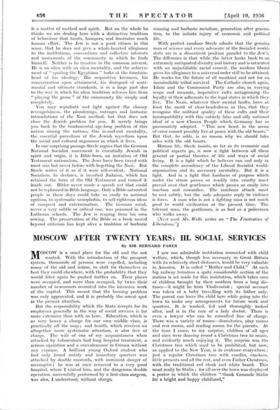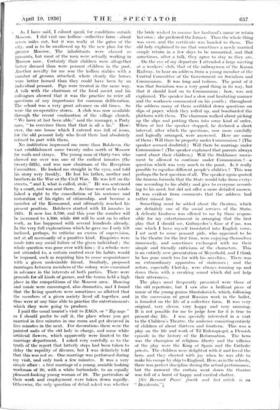MOSCOW AFTER TWENTY YEARS: III. SOCIAL SERVICES
By SIR BERNARD PARES
MOSCOW is a cruel place for the old and the not wanted. With the introduction of the passport system, thousands of persons were expelled, including many of the old and infirm, to shift for themselves as best they could elsewhere, with the probability that they would later again be pushed further on. Their places were occupied, and more than occupied, by twice their number of newcomers recruited into the intensive work of the capital. This meant that the housing problem was only aggravated, and it is probably the sorest spot in the present situation.
But the responsibility which the State accepts for its employees generally in the way of social services is far more extensive than with us here. Education, which is so very heavy a charge for our own middle class, is practically off the map ; and health, which receives an altogether more systematic attention, is also free of charge: The wife of one of my acquaintances when attacked by tuberculosis had long hospital treatment, a serious operation and a convalescence in Crimea without any expense. A brilliant young Oxford student who had only found untidy and insanitary quarters was attacked by double mastoids, with imminent danger of meningitis ; he was at once removed to a very good hospital, where I visited him, and the dangerous double operation, successfully performed by a first-class surgeon, was also, I understood, without charge. I saw one admirable institution connected with child welfare, which, though less necessary in Great Britain with its relatively short distances, would be very. valuable in America. It is called "Mother and Child." At each big railway terminus a quite considerable section of the station is set aside for this institution, which takes care of children brought by their mothers from a long dis- tance—it might be from Vladivostok ; special account was taken of a baby travelling with its father only. The parent can leave the child here while going into the town to make any arrangements for future work and quarters. It is washed, fed and thoroughly looked after, and is in the care of a lady doctor. There is even a lawyer who can be consulted free of charge. There was a variety of rooms—dormitories, play. rooms and rest rooms, and- reading rooms for the parents. At the time I came, to my surprise, children of all ages and sizes were dancing round a Christmas tree to music, and evidently much enjoying it. The surprise was the Christmas tree which used to be prohibited, but now, as applied to the New Year, is in evidence everywhere : -just a regular Christmas tree with candles, crackers, little presents and all the rest, and even Father Christmas, with the traditional red cloak and white beard. This must really be Stalin ; for all °vet-the town Was displayed a poster in which the children "thank Comrade .Stalin for a bright and happy childhood." . As I have said, I. calmot speak for. conditions outside Moscow. I did visit one kolhoz—collective farm—about seven miles out, but it was really at the gates of the city, and is to be swallowed up by the new plan for the greater. Moscow., The inhabitants were classed as peasants, but most of the men were actually , working in Moscow now.. Certainly their children were altogether better dressed than were peasant children. in the past. Another; novelty. for me was the kolhoz stables with a number of grooms attached, where clearly the horses were better housed than they could have been by an individual peasant. Pigs were treated in the same way. A talk with the chairman of the local soviet and his colleagues showed that it was the practice to refer all questions of any importance for common deliberation. T,he school was a very great advance on old times. So were the co-operative, stores. A club was now available through the recent confiscation of the village church. ", We have at .last been able," said the manager, a Party man, "to convince them that that is all a lie." How- ever, the- one house which I entered was full of icons, for the old peasant lady who lived there had absolutely refused to part with them.
No, institution impressed me more than Bolshevo, the vast establishment some twenty miles north of Moscow for waifs and strays. The young man of thirty-two who showed me over was one of the earliest inmates (the twenty-fifth), and was now chairman of the Reception Committee. He looked me straight in the eyes, and told his story very frankly. He lost his father, mother and brothels in the War or the Civil War, lie was left on the streets, "and I, what is called, stole." He was sentenced by a court, and was seat there. As time went on he estab- lished a tight to the cancellation; of his sentence and restoration of his rights of citizenship, and became a member. -of the Komsomol, and ultimately. reached. his present position.. Bolshevo started with 13 inmates in 1924. It now has 3,700, and this year the number will be increased to 4,500, while 400 will be sent on to other work, as has happened with several hundreds already. In the very full explanations which he gave me I only felt inclined, perhaps, to criticise an excess of supervision, not ;at. all necessarily of .a-pnnitive kind.- Enquiries were made into, any social failure of the given individual ; the whole question was gone over with him ; if a rebuke were not attended to, a certain control over his habits would be imposed, such as requiring him to cease acquaintance with a given undesirable friend. . Similarly, proposed marriages between members of the colony were examined in advance in the interests of both parties. There were grounds for all kinds of games, and the teams held a high place. in the competitions of the Moscow area. Dancing and music were encouraged, also dramatics, and I found that the living quarters were sometimes so allotted that the members of a given society lived all together, and. thus were at any time able to practise the entertainments which they were going to produce. .
I -paid the-usual tourist's visit: to ZAGS, or " Zig-zags " as I should prefer to call it, the plate where you get married in five minutes in one room and get divorced in five minutes in the next. For decorations, there were the painted nails of the old lady in charge, and some white artificial flowers, which apparently were limited to the marriage department. I asked very carefully as to the truth of the report that latterly steps had been taken -to delay -the -rapidity of divorce, but I was definitely told that this was not so.. • One marriage was performed during my visit, and. only took a few minutes. . It was a very simple affair : a first marriage of a young, amiable-looking workman of 26, with a. white buttonhole, to an equally pleasant-looking young woman of 18. The particulars of their work and employment_ were taken down rapidly. Otherwise, the only question of detail asked was whether the bride wished to assume her husband's name or retain her own.: stiepreferred the former. Then the whole thing was over, and the certificate was handed to them. The old lady explained to me that sometimes a newly married couple return in a few days to be unmarried, and that sometimes, after a talk, they agree to stay as they are.
On the eve of my departure I attended a large meeting at a workers" club, that of the ,railwaymen of the Kazan Railway, to hear an address from a young member of the Central. Committee of the Government on Socialism and Communism. It was long and tedious. The point of it was that Socialism was a very good thing in its way, but that it should lead on to Communism how, was not eplained. The speaker had a slow and hesitating manner and the workmen commented on his youth ; throughout the address many of them scribbled down questions on slips of paper. which they rolled up, and bombarded the platform with them. The chairman walked about picking up. the slips and putting them into some kind of order.
When at last the speaker stopped, he declared a short interval, after which the questions, now more carefully and logically arranged, were answered. Here are some of them : Will there be property under Communism ? (The speaker seemed doubtful.) Will there be marriage under Communism? (The speaker explained that parents always cared about their children.) Will the Stakhanov. move- ment be allowed to continue under Communism ?—a question which was very Lunch to the point, Is it really possible to equalise different people's abilities ? This was perhaps the best question of all. The speaker again quoted the famous formula that the State would take from every- one according to his ability and give to everyone accord- ing to his need, but did not offer a. more detailed answer. It . was evident front comments that the address had rather missed fire.
. Something must -be added about the theatres, which are definitely one of the social services of the State.
A. delicate. kindness was offered to me by those respon- sible, for my entertainment in arranging that the first play that I should see, thiboyedov's Core at Un,a, was one which I have myself translated into English verse.
I sat next to some peasant girls, who appeared to be in the theatre for the first time, were enjoying themselves immensely, and sometimes exchanged with me their simple and friendly criticisms of the characters. This is an entirely new presentation of Aleyerhold, and I think he has gone much too far with his novelties. There. was an extraordinary apparatus of staircases ; and the actors, especially Chatsky, were always running up and down them with a creaking sound which did not help their utterances.
: The plays most frequently presented were those of the old repertoire, but I saw also a brilliant piece of music of the young genius Shostakovich, which, following in the succession of great Russian work in the ballet, is founded on the life of a collective farm. It was very original, very clever, very happy and very amusing. It is not possible for me to judge how fur it is true- to present-day' life. I was specially interested in a visit to the Children's Theatre, the audience consisting entirely of children of about thirteen and fourteen. This was a play on the life and work of Til _Eulenspiegel, a Flemish episode in the history of the Reformation. The hero was the champion of religions liberty and the villains of the play were the King of Spain and the Catholic priests. The children were delighted with it and loved the hero, and they cheered with joy when he was able to make his escape by ship-to England. Here, as in the schools, 'there was perfect discipline during the actual performance, but the moment the curtain went down the theatre was full of a- burst of happy and excited chatter.
[Sir Bernard Pares' fourth and last article on "Desiderata."1











































 Previous page
Previous page